 By Pepper Parr
By Pepper Parr
February 5th, 2019
BURLINGTON, ON
The City’s 10-year Capital Financing Strategy is heavily dependent on both annual dividends and interest on the note receivable from Burlington Hydro – but the financial statements weren’t given even a wink at the Standing Committee Monday night. The report will get looked at again at a city council meeting on February 25, 2019.
Last night the best council could do was Receive and file finance department report F-04-19 regarding the 2019 Business Plan for Burlington Hydro.
Burlington Hydro is owned by the city – 100% of it.
Burlington Hydro Inc (BHI) and Burlington Electricity Services Inc (BESI) are affiliate companies both of which are 100% owned by Burlington Hydro Electric Inc (BHEI). BHEI is 100% owned by the Corporation of the City of Burlington.
BHI is a regulated company, regulated by the Ontario Energy Board (OEB). It is a local distribution company (LDC) with a mandate to deliver electricity within the municipal boundaries of the City of Burlington. BHI applies for and receives approval from the regulator to charge for its services.
BESI is a non-regulated company and engages is those aspects of BHEI’s business which are not regulated. Under contract from BESI, BHI provides water/waste water billing services for the Region of Halton.
The core strategic objectives for 2019 are:
• Optimize revenue – guiding current and capital maintenance expenditures and preparing BHI for the next rate application.
• Survey and Consult Employees – regarding job engagement and develop actions to improve employee satisfaction and productivity.
• Refine and develop education tools for customers – to help with customer and staff education on prevailing issues and differentiate between issues BHI can and cannot control.
• Institute a culture of continuous improvement – identify areas where effectiveness of the organization can be improved.
• Pursue opportunities to grow revenues – through non-regulated activities
• Halton first preference – although none are currently underway this would be key to any merger discussions
There is a lot of corporate happy talk in those strategic objectives.
The strategic principles that support the objectives are:
• Does not impact negatively on the projected dividends to the City.
• Add value for the City, either through increased ownership in the short term or increased dividends in the longer term.
• Positions the utility strategically for the future.
• Retains control. Any transaction must allow the City to retain full control of the ownership of the utility.
In a report that sets out an overview of the 10-year business plan for the next ten fiscal years will xxxfive fiscal years during which time frame GET THE NUMBERS IN HERE one would have liked to know that a) all the council members have actually read the report and b) that they have something inteligent to say.
BHI NET INCOME FORECASTED 2018-2027
Forecasted net income for the next ten years is presented as follows:

Forecasted net income for the hydro operation.
The 2018 update presents a positive variance of $114k from budget of earnings before tax of $4.482M with the update showing $4.596M
Factors affecting the 2018 forecast are as follows:
• Distribution revenue is forecast to drop below budget by ($206k). This is primarily attributable to energy conservation programs which have been mandated over 14 years. The programs decrease the needs of the larger commercial/industrial customer base.
• Other revenue is forecast to exceed budget by $869k. Two sources of revenue were unbudgeted but are included in the update. These are $185k of revenue for Milton Hydro Control Room Services and $926k in CDM (conservation demand management) bonus’ for achieving target. An offset to these increases was the OEB mandated winter moratorium on collection fees.
• Operating expenses are forecast to be over budget by ($764k). Among the significant factors are:
• Control Room and overtime costs were adversely impacted ($270k) due to weather events that caused power outages.
• Overtime hours were needed for the implementation of the Milton Control Room services contracted. These costs are one-time in nature.
• The Distribution/Lines Department also incurred additional costs in labour and materials to restore power from the weather events. ($176k)
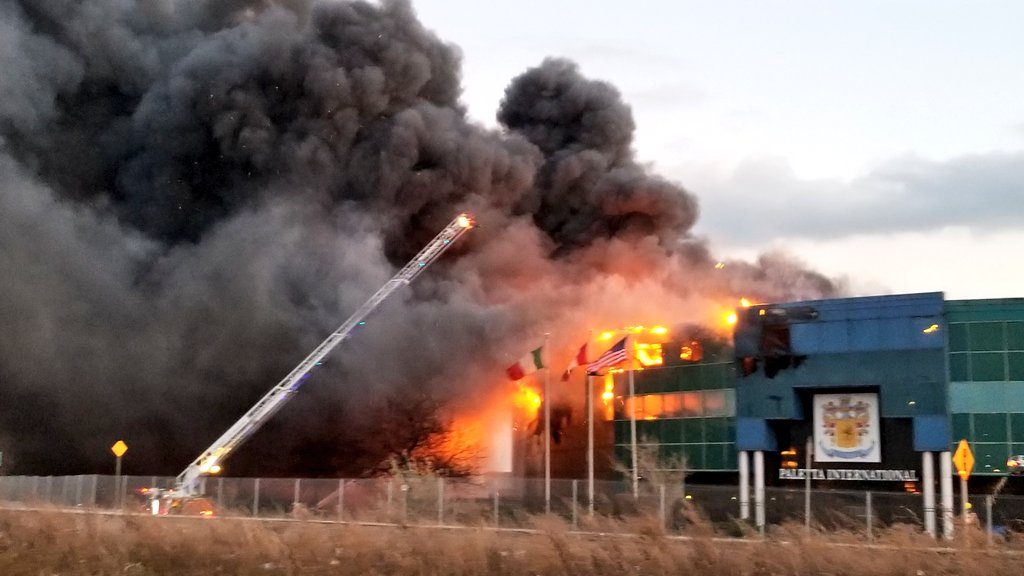
The fire at the Paletta site left Burlington Hydro stuck with an unpaid electricity bill.
• Billing and Collecting will exceed budget by ($265k). A fire and resulting receivership of a commercial customer resulted in a ($248k) write off in 2018. Legal remedies are being pursued to recover the funds. The fire was the blaze that took place at the Paletta Tender Foods operation.
The 2019 budget shows a reduction in net income over the 2018 update. The most significant area contributing to this reduction is in miscellaneous revenues.
The 2018 update includes $926k of CDM mid-term bonus which was not included in the budget. Also, there is a reduction of ($350k) due to the OEB proposal to eliminate the utilities charges for collection notices. The last two years saw a moratorium on winter disconnects and collection charges.
The results achieved by BHI are of importance to the shareholder as the dividends flowing to the shareholder from BHEI are composed of earnings from BHI and BESI.
TEN-YEAR CAPITAL BUDGET AND FORECAST
In keeping with BHI’s Asset Management strategy the capital budget and forecast identifies projects that are part of its sustaining capital budget as well as ensuring that Burlington has an adequate supply of electricity.
These include:
• Customer demand projects including connecting new customers, building new subdivisions and relocating system plant for roadway construction work.
• Renewal which focuses on replacement of assets that have reached end of useful life. New assets require less maintenance, deliver better reliability and reduce safety risks to the public.
• Security which could include adding switching devices or creating a backup feeder supply to reduce the risk to typical restoration times.
• Reliability which supports maintenance of or improvement to the Service Quality indices measured and submitted to the OEB each year.
• Substations which are invested in to improve or maintain reliability to large numbers of customers and to maintain security and safety at the substation sites.
The renewal or retirement of Burlington Hydro’s 4.16 kV substations is part of the annual review undertaken as part of the Asset Management strategy.
• Customer Connections and metering include meter installations, meter upgrades and the capital components of wholesale and retail meter verification activities.
There are also special projects which are outside the sustaining capital program. These are:
• Capacity improvements for new customer connections and increased demand of existing customers.
• Developer Buybacks which involves BHI purchasing new subdivision assets as they are put in place by developers.
• Regulatory Requirements which are system capital investments driven by regulatory requirements. These directions may come from the OEB, IESO, the Ministry of Energy or the Ministry of the Environment.
Forecasted capital expenditures from the Business Plan are presented in the following chart:
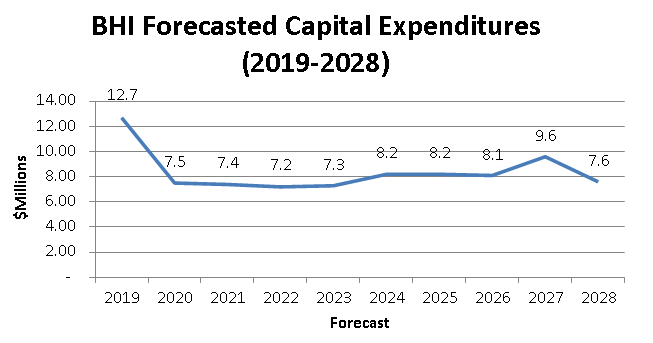
BHI Forecasted Capital Expenditures (2019-2028)
The 2019 capital budget has been developed using data from the asset management plan. The focus on maintaining the distribution system remains.
Some significant capital projects for the 2019 capital program are:
• Tremaine TS – $2.5 million
• Pole Replacements – $200k
• Underground primary projects – Burlington Hydro confers with the various Municipal authorities and local developers in planning the capital budget based on upcoming Municipal and Developer driven projects involving hydro relocations and infrastructure upgrades. The following has been identified for 2019:
-$900k to service the downtown core underground development.
Construction cost will be partially funded through capital contributions from developers of $500k.
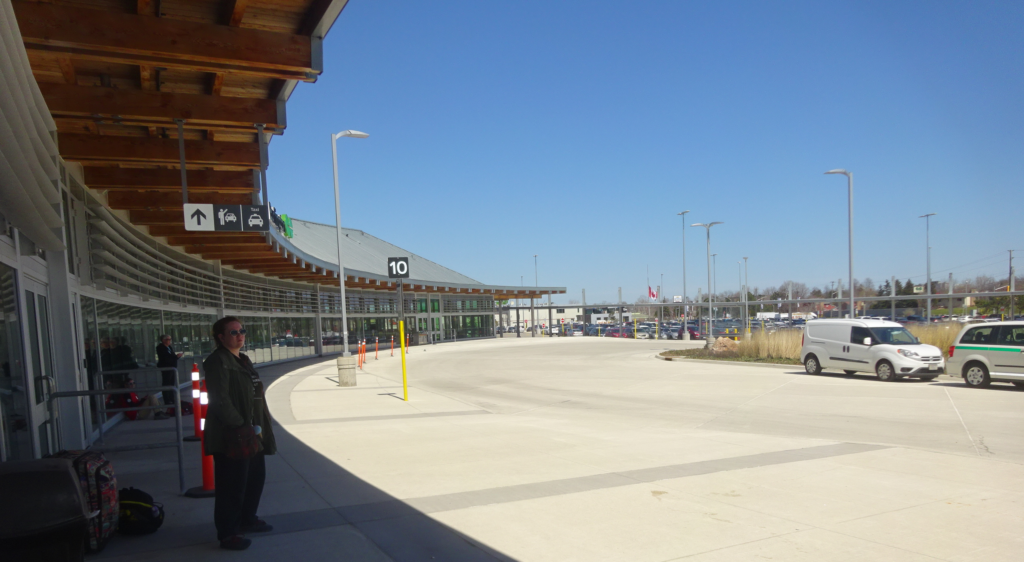
The electrification of the GO service will have a significant impact on the hydro operation.
• As part of the Metrolinx Corridor Electrification project, Burlington Hydro is required to bury all of its existing overhead crossings. The $5.1 million construction costs will be partially funded through a $5 million capital contribution from Metrolinx. BHI will be responsible for the balance which is the replacement of additional underground ductwork. There are other significant capital projects related to the Corridor Electrification such as construction of new overhead termination poles and temporary pole line relocation to facilitate construction of a new railway underpass at Burloak Drive. The capital costs for the additional work will be covered by Metrolinx.
Other projects in the budget are as a result of BHI’s annual electrical distribution system inspection.
BALANCE SHEET
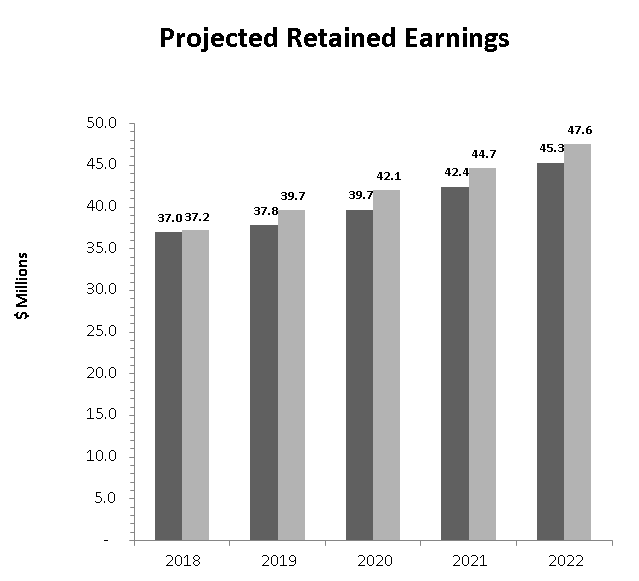 Drop in retained earnings graphic
Drop in retained earnings graphic
(i) Retained Earnings
BHI continues to forecast retained earnings growth that represents value of increased ownership in a larger company. The following chart illustrates retained earnings growth forecast in the first five years of the 2019 business plan:
Projected Retained Earnings
(ii) Long Term Debt
Funding has been in place with Infrastructure Ontario since 2010 for financing the Smart Meter program. This loan has a 15-year amortization period at a fixed rate of 4.51%. A second loan that assisted with financing the Hydro One Transformer Station capital contributions has a 25-year amortization period at a fixed rate of 4.02%.
The 2017 Budget included a new term loan of $7M with a 15-year amortization to provide a matching of long-term funds against BHI capital expenditures. The first draw down of the loan was December 15, 2018. Rate was to be set at draw down. The current fixed rate is expected to be 3.62%. Since the 2013 loan, the company has used working capital to finance capital expenditures. The additional long-term debt will ensure that both existing working capital and short-term operating credit is sufficient to cover working capital needs in 2019.
The forecast also includes the costs of maintaining a $10m operating line of credit for working capital needs and an $18M letter of credit facility to cover prudential requirements related to the monthly power bill with the IESO. The operating line includes an option to increase the amount to $25m.
BURLINGTON ELECTRICITY SERVICES INC. (BESI)
BESI is the sister company to the distribution company BHI. Unlike BHI, which is closely regulated by the OEB, BESI operates as an unregulated business. Its divisions include:
Streetlights – In July 2017 BESI was successful in signing the Street light contract with the City of Burlington. The contract involves the supply and installation of LED Luminaries to replace existing high-pressure sodium street lights. The 2018 update includes revenues and costs for Phase 3 and 4 as well as additional revenues from miscellaneous maintenance work assigned by the City. As the project was expected to be complete by the end of 2018, only minimal profits have been incorporated in the 2019 plan.

Operating costs and depreciation of $80,000 for these lights in Spencer Smith Park: that’s a pretty penny – is their value for money in this ?
Festival of Lights Division – This division contains the annual costs of operating the Festival of Lights net of any sponsor donations. 2019 forecasts donations of $21k against operating costs/depreciation of $80k.
Region Billing Division – provides water billing services for the Region of Halton. The contract was renewed in June 2018 for a five-year period with renewal options. The contract is expected to contribute a net margin of $784k in 2019.
Solar Array Division – Its revenues are derived from a solar array which was connected in 2012 to the City’s Fire hall 8. General maintenance of the array is the division’s operating costs.
Vehicle Charging Station Division – The uptake for new EV charging stations has not materialized as had been budgeted. Operating costs are being incurred for marketing and promotion. The budget for 2019 includes 10 residential units, 25 Multi-unit residential units and 10 commercial chargers. A net loss of ($7k) is forecast.
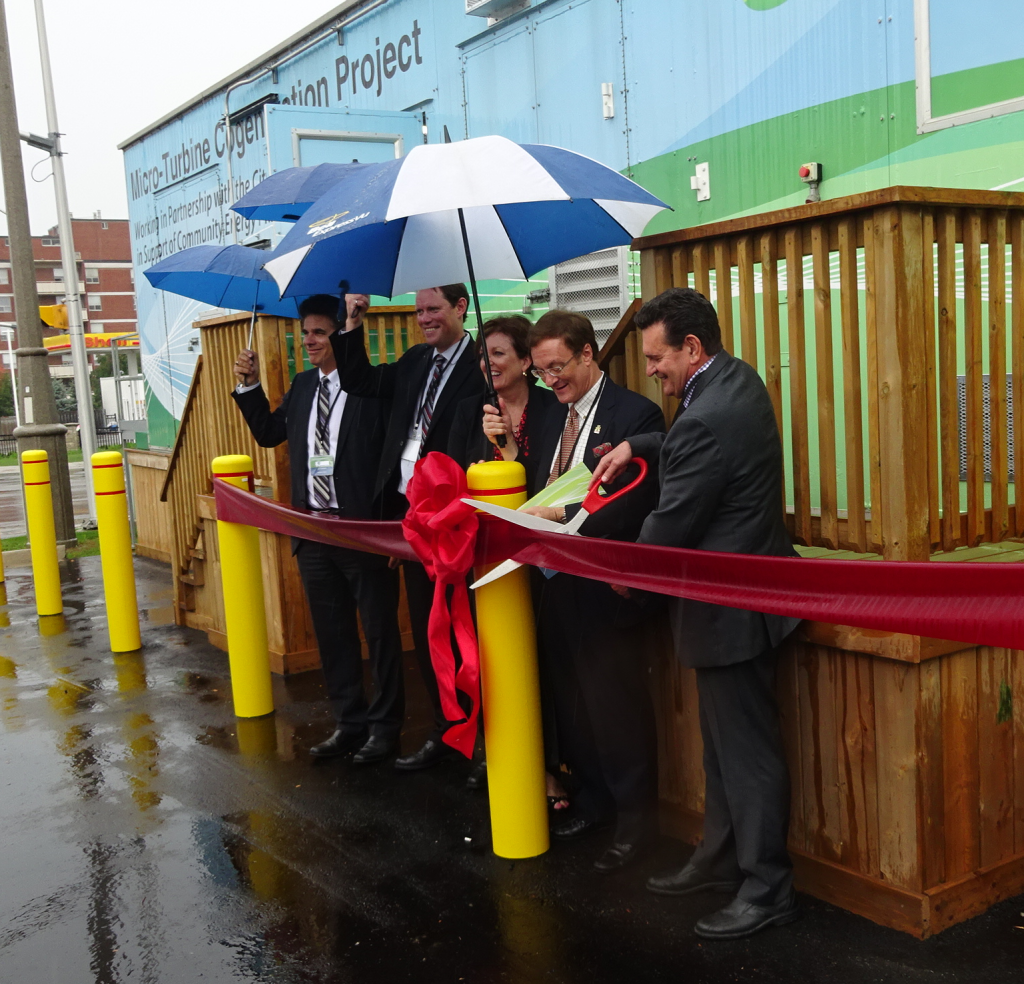
The co-generation operation heats and cools some of the hydro operation offices.
Other operating divisions of BESI include the Co-Generation Division which holds the Mobile Turbine Co-Generator located at the Brant Street Office. This was initially set up as a Community Energy Plan demonstration project.
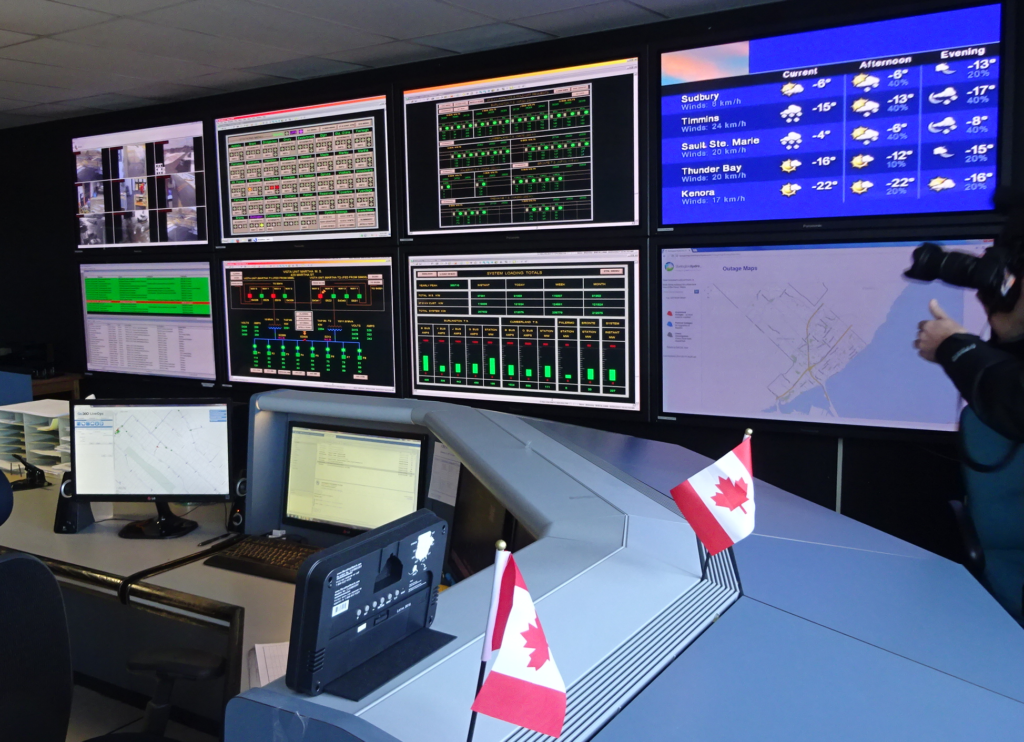
The Hydro operations Centre – they also manage the Milton system.
The Control Room Division provides control room monitoring for Milton Hydro. The Suite Metering Division includes user fees generated from 85 gas and water suite meters acquired from Oakville Hydro in late 2018.
Overall net income after tax is forecast to have a positive variance of $40k. This is primarily the result of the street light lamp retrofit project.
Net income for 2019 is budgeted at $507k, a decline of ($66k) from the 2018 update which is primarily due to the completion of the retrofit project.
DIVIDENDS
Annual dividends paid to the shareholder are composed of dividends from BHI operations, BHI working capital and BESI net income. The dividends forecast are consistent with those in the 2018 budget and 10-year forecast.

The total dividends to be received by BHEI for the years 2021-2028 are $50k/year higher than the dividend being passed onto the City. The additional dividend is being retained by BHEI to provide working capital to cover administrative costs.
Dividends received from BHEI contribute to the City’s capital plan, in particular, for legacy projects such as the Burlington Performing Arts Centre.
Regulatory/Political Risk
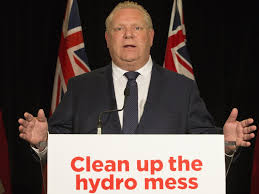
Premier Doug Ford used what he called the hydro mess to get himself elected – then lost an opportunity for Hydro One to acquire a major hydro operation in the western United States. One never knows what the Premier will do next.
As a regulated business, BHI is subject to the direction of Government legislated boards and committees. With the change in provincial government in the 2018 election, changing energy policy introduces risk and uncertainty into the electricity industry. Initiatives, most recently the Ontario Fair Hydro Plan and the cancellation of the Cap and Trade program, can be introduced unpredictably and simultaneously put pressure on BHI’s resources and create pricing change for BHI’s customers. This in turn introduces shareholder risk due to the reliance the City has on dividends from the utility.
Cost of Service Review
The OEB has established a five-year cycle in which the local distribution companies must undergo a full “cost of service” review. BHI filed a cost of service application in 2014. As a result of the cost of service review, the City was impacted by having the interest rate on the promissory note dropped from 5.87% to 4.88%. The original interest rate on the note was 7.25%. City staff have taken a conservative approach in the cash flow forecast for the capital program. The next cost of service review is expected to occur for 2020 rates. The 2019 business plan forecasts the interest rate on the note to decline in 2021 from 4.88% to 4.16%.
The following outlines actual cash flow received by the City from BHEI:
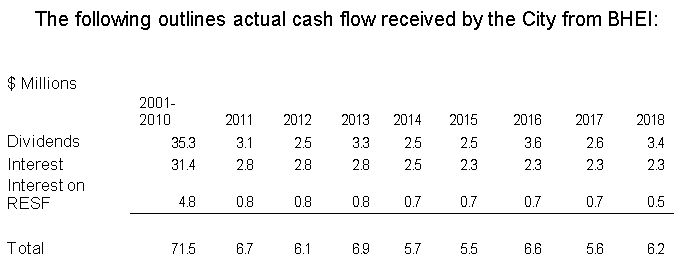
Opportunities
It is through BESI, the unregulated company, that the shareholder has opportunities for strategic initiatives. BESI has set out as part of its overall business strategy to pursue in-scope services and new business ventures. Services that might be pursued would be intended to minimize risk to the taxpayers while representing an opportunity to establish and/or enhance existing common or shared services.
Working strategically with Hydro management presents the City with an opportunity to find creative solutions that will ensure fiscal sustainability.
BESI has engaged in the sale of water and gas metering for a condo in Burlington. This could include thermal metering in the future. This can be used as the model to expand a full package of metering services to existing and future condo developments. It represents an exciting opportunity to expand and sustain a new business stream for the company.
Infrastructure Ontario Loan
The Infrastructure Ontario Loans require that the City sign a subordination agreement which subordinates the City’s position as a debt holder. The agreement also includes certain covenants and restrictions that could affect the City’s ability as shareholder to sell or otherwise dispose of the asset. However, the City has executed such agreements in the past as the risk is considered relatively low.
Financial Matters:
The dividend forecast to the City remains consistent with that of the 2018 budget and forecast.
The Hydro reserve fund, which receives funds from Hydro as dividends from BHEI and interest on the promissory note from BHI, is integral to the city’s capital program. It provides and on-going allocation of $2.1 million annually to the capital budget for infrastructure renewal and allows for the issuance of Special Circumstances debit (SCD).
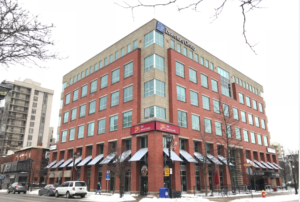
Hydro money was used to pay for the purchases of the Sims Square building – which meant the city wasn’t going to be building a new city hall for at least a decade.
In recent years it has also been used to fund major unplanned capital initiatives in the city such as the purchase of Sims Square and the storm water flood mitigation projects. The Hydro reserve fund also provides $350,000 annually to the operating budget.
Connections:
BHEI has identified areas in the City’s 25-year strategic plan where it has a role to play in aiding the City to realize the strategic vision. These are:
• Energy-efficient buildings and other onsite sustainable features are the norm, thereby improving Burlington’s environmental footprint. Existing buildings are being renovated to improve efficiency.
• Create employment lands vision to unite the community, developers and industry
• 15,000 new knowledge-based jobs by 2025 Environmental Leadership
• The city’s operations are net carbon neutral.
• The city achieves its major goals outlined in the Community Energy Plan
• Better environmental outcomes to improve quality of life, economic competitiveness and foster civic pride.
Some observations:
Hydro is critical to the economic health of the city.
Hydro is basically a closed operation; its meetings are not open to the public and the public relations people are pretty tight lipped unless they are patting themselves on the back for something they did with your money.
Hydro service throughout North America are undergoing a process of consolidation. A hydro operation north of Burlington is working through a process of considering various consolidation possibilities; they reached out to Burlington Hydro asking if they would be interested in participating in those conversations. The Gazette was told that Burlington didn’t even respond to the request.

Miller Road during the 2013 ice storm. The hydro team delivered superb service during a tough period of time.
The change in the size of the hydro operations is underway – Burlington Hydro seems to want to take a pass – should they do that – it is Burlington that will get passed.
On the upside – those who experienced that ice storm in 2013 – few will forget the incredible job that hydro did to get service back up and running in pretty short order.















Give credit to Burlington Hydro (BH) for running a solid business. Service is always there at the flick of a switch, or quickly restored in event of an outage. I appreciate that the City owns BH. Ownership gives us options. The financials look extremely strong, as you would expect from a benevolent monopoly.
With industry leaving Ontario and Burlington due to high energy costs, and residents being squeezed with the same rising energy costs, maybe the numbers are too strong.
Burlington Hydro, in 2018, had a reserve of $37 M (retained earnings), projected to rise by 25% to $47 M by 2020 (3 years from now). Return to the CoB in 2018 was $6.2 million. Return to Hydro was $50k more than the return to CoB in 2018. So a healthy return is garnered.
Having this much money in reserve and with the reserve growing at a fast rate, raises questions. Mainly, are we being overcharged for our hydro? Should the money be reinvested elsewhere, such as geared to income housing, or some other essential benefit to our community?
Energy costs are cited as a reason for business to enter or leave an area. Ontario used to have some the most affordable energy rates around. Maybe they were underpriced. Not any more.
Council needs to look at the numbers and ask some challenging questions.
Note to council, more transparency please, we are not mushrooms that are kept in the dark and then fed m..ure.
Did you ask each councilor? It would be interesting to know what each has to say.